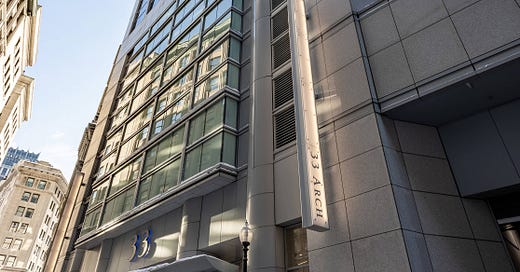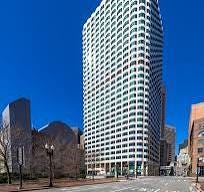03.21.2025
Healey administration pushing ahead with a woke overhaul of state’s vocational schools | Catch 22 situation for researchers caught in Trump DEI crackdown | Crumbling Boston tower values bad news for teacher retirement savings | Next Celtics owner little-known tech bro |
Hidden cost of office market meltdown: Teacher and public employee pension funds are taking big losses on billions of dollars invested in downtown towers
The collapse of the office market is a looming catastrophe for the downtowns of cities across the country, from Boston to San Francisco.
Boston and other cities will likely lose billions in tax revenue as companies jettison office space and the value of downtown office towers plunge.
But there is another aspect of this disaster that received far less attention in the local mainstream media, and it’s this: All those crumbling office tower values are also pretty bad news for the retirement savings of millions of teachers and public sector employees.
The Teachers Insurance and Annuity Association of America, or TIAA, and other organizations that invest public sector pension dollars have long been big buyers of office buildings.
And for decades, the office sector was a fairly safe bet, with its fortunes tied to the ups and downs of corporate America.
TIAA over the years amassed a $1.7 billion portfolio in Boston, making it one of the biggest office building owners in the city.
But that has all changed over the past five years amid the post-pandemic shift to remote work.
Now TIAA and an array of pension funds are taking big losses as they scramble to sell once-prized office towers that have now become rapidly depreciating assets.
TIAA’s real estate arm, Nuveen, has spent several months attempting to unload the 99 High St. tower in downtown Boston.
The 32-story tower, built in the early 1970s, is not just figuratively, but literally, half empty, industry sources say.
Even if it manages to get the roughly $260 million it is seeking for the Keystone Building - a little less than what it bought the tower for a decade ago - it will still represent a significant loss for TIAA.
Adjusting for inflation, 99 High should be worth $364 million today.
Likewise, Nuveen recently sold its remaining 50 percent stake in 501 Boylston St. in the Back Bay and in the 33 Arch St. tower near Downtown Crossing for far less than what it originally paid.
The buyer, a Norwegian bank, paid just $248 a square foot for the remaining half of 33 Arch it didn’t already own – or less than half of what Nuveen laid out more than a decade ago, the Globe reports.
TIAA’s Nuveen has also taken big hits in other markets.
The TIAA real estate arm sold the Xerox building in the D.C. suburb of Rosslyn for $25 million last year, a fraction of the $141 million it shelled out back in 2011, according to the Washington Business Journal.
In San Francisco, TIAA is trying to unload 88 Kearney, a 234,000-square-foot office building, for around $65 million – what it bought it for a quarter century ago, the San Francisco Business Times reports.
Back in 2019, the building was worth more than $200 million.
Closer to home, MassPRIM, which manages tens of billions in retirement funds for teachers and state employees, has taken a hit in the real estate market as well.
The Pension Reserves Investment Trust (PRIT) Fund saw a more than 6 percent drop in returns on its real estate portfolio for the year ending in June 2024, according to a MassPRIM report.
This is terrible news for Boston and for other cities, which have benefited from a steady stream of pension fund investment dollars over the years into their downtowns.
And it’s also not so great for the public employees whose retirement savings will surely slide, thanks to the office market collapse.
Just call it a growing, multi-dimensional disaster.
William who? Celtics to be sold to uber-wealthy tech bro who isn’t exactly a household name in New England
Forget all the months of media speculation that the Celtics would be sold to everyone from Jeff Bezos to billionaire Red Sox and Globe owner John Henry.
The team’s next owner will be someone most of us have never heard of: William Chisholm, managing director and co-founder of Symphony Technology Group, a private equity firm based in Menlo Park, Calif.
Keep reading with a 7-day free trial
Subscribe to Contrarian Boston to keep reading this post and get 7 days of free access to the full post archives.





